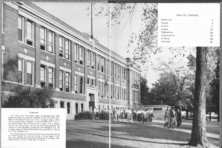Sturgeon Bay’s Solid-Waste Fees on the Rise
- Share
- Tweet
- Pin
- Share

Sturgeon Bay’s Finance/Purchasing and Building Committee backed a recommendation Feb. 14 from city treasurer/finance director Val Clarizio to increase the city’s monthly solid-waste user fee by 13.4% each year for the next five years.
The current monthly fee of $10.42 included in utility bills would rise to $11.82 in 2024, $13.40 in 2025, $15.20 in 2026, $17.23 in 2027 and $19.54 in 2028.
Solid-waste user fees have increased 3% per year over a six-year period, from $8.99 in 2018 to the current $10.42.
Clarizio said refuse-related costs and loan interest rates have increased. When the city last set solid-waste user-fee rates, she said the overall plan called for saving money to pay cash for some of the refuse trucks, while continuing to borrow.
“We just recently purchased two trucks – we borrowed for those – and then we purchased a third truck, and that one we paid cash for,” she said.
The recommendation for the 13.4% annual increases and for trucks to be funded 100% by borrowing was the lowest of the three options Clarizio presented. The second option called for annual increases of 17% and would fund truck purchases 50-50 with available cash and borrowing. The third option was annual increases of 21%, with truck purchases funded with cash.
Clarizio called the 13.4% annual increases “patable and equitable.”
Her report to the committee included monthly rates being charged for refuse collection by other municipalities in Door County, via the tax roll, with higher fees currently in the Village of Forestville ($19.11), the Town of Forestville ($17.35), the Town of Union ($16.10) and the Town of Nasewaupee ($12.73).
City administrator Josh VanLieshout said a solid-waste user-fee schedule for multiple years will make it possible for staff to plan for future capital-acquisition needs and to have sufficient funds on hand to pay debt service.
“The numbers that we have in front of you we feel confident are what we’re going to need to cover those changes in cost,” he said. “Certainly, with any projection, the further out you go, the greater the assumptions have on the bottom dollar. But what we’ve accounted for 100% is the need to pay the debt service and then of course our projected labor and our projected tipping fees.”
VanLieshout said the city could reduce costs, such as collecting garbage every other week instead of weekly, but that would likely result in smelly garbage during the summer.



